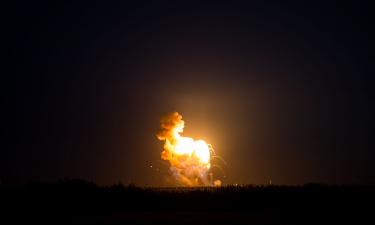Venezuela: blasts injure three as opposition boycotts elections
Blasts from small explosives injured three people in a military base and near a government office as Venezuela prepared for a congressional vote Sunday amid a boycott called by opposition parties, the attorney general's office said.
One homemade explosive went off near a government legal office Friday afternoon, lightly wounding a 22-year-old man and a youth, said Aryeli Vera, spokeswoman for the attorney general's office. Two other explosives thought to be grenades went off in Fort Tiuna military base in Caracas, seriously wounding a 31-year-old police officer, she said.
"I don't want to blame all the opposition, but there are absolutely irrational sectors in the opposition camp who believe they can disturb the process with those acts," Vice President Jose Vicente Rangel told reporters Saturday.
President Hugo Chavez has accused major opposition parties of staging a U.S.-backed conspiracy by pulling out of elections days before the vote.
The U.S. government has denied involvement, while major opposition parties say they won't participate because they don't believe conditions are in place for a fair vote.
Pro-Chavez candidates are aiming to win a two-thirds majority up from their current 52 percent in the 167-seat National Assembly at Sunday's polls. That would allow them to rewrite portions of the constitution and push back term limits for the presidency and other offices.
The government said soldiers and police were on alert after discovering C-4 explosives and other materials intended to disturb the vote through violence.
The authorities arrested 11 people in the western state of Zulia on Friday night who allegedly stockpiled dozens of Molotov cocktails to try to "disrupt public order," prosecutors said in a statement.
Officials also said they stopped the group while they were trying to block a road and seized 31 containers of fuel, tacks, tires and identification cards falsely making them appear to be Venezuelan soldiers.
Rangel said the opposition boycott announced days before the vote was part of a plot by U.S. President George W. Bush's government to tarnish perceptions of Venezuela's democracy. Chavez, a close ally of Cuba's Fidel Castro, has called Bush a madman and said the U.S. is bent on ousting him.
"We're convinced that part of the destabilizing strategy used by Mr. Bush's government in Venezuela is precisely to try to delegitimize the electoral process," Rangel told reporters.
He said parties that pulled out knew "they were defeated at the polls" based on opinion surveys, and would have won perhaps 30 seats out of 167 in the National Assembly. The opposition currently holds 76.
"It's their final political burial," Rangel said, adding that their absence was their own fault and wouldn't affect the vote's legitimacy.
Opposition leaders have argued the National Electoral Council is pro-Chavez. They also have alleged irregularities with the voter registry and argued that touchscreen voting machines are vulnerable to confidentiality breaches.
The electoral council insists it is independent and the vote will be fair.
"It would be hard for any other country in the world to have more guarantees for the opposition," Rangel said, noting the opposition pulled out after the council ceded to demands that fingerprint machines not be used due to privacy concerns.
The Organization of American States, which has 50 observers monitoring the vote, said before the boycott that "important advances" had been made to generate confidence in the election. The European Union has an additional 160 observers on hand.
Chavez and his supporters say the boycott is one in a series of anti-government plots, including a short-lived 2002 coup, a crippling strike that ended in early 2003 and a failed presidential recall vote last year.
"This is a coup against democracy. It's sabotage," said store worker Julio Torre, 33.
Others said they wouldn't cast ballots. "If there were a real opposition, I would've voted," said Edilma Alferis, 65, reported AP. P.T.
Subscribe to Pravda.Ru Telegram channel, Facebook, RSS!





